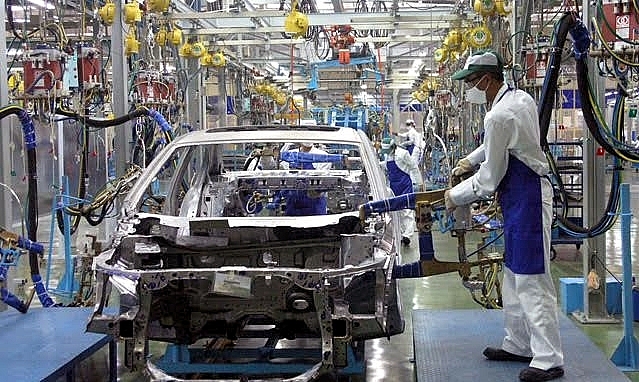Imports, domestically-assembled cars in battle for market share
 |
| Domestic automobile manufacturers plan to launch new models |
The Ministry of Transport (MOT) has stirred up the market by accepting an Indonesian Vehicle Type Approval (VTA) certificate. Three imported cars from Indonesia arrived last week from March 16-22. Prior to that, a large quantity of Thailand sourced cars were reportedly docked at Vietnam’s ports, ready for delivery after customs clearance. While importers rush to import cars, domestic automobile manufacturers have geared up with their production plans.
| VinFast, a newcomer in the market, has announced a plan to manufacture two more small-size petrol-run and electricity-run models, scheduled to hit the market in 2019. |
Hyundai Thanh Cong and Hyundai Group in South Korea have signed an MOU on building a new factory in 2019 which will help increase output for exports.
VinFast, a newcomer in the market, has announced a plan to manufacture two more small-size petrol-run and electricity-run models, scheduled to hit the market in 2019.
Meanwhile, Truong Hai Automobile on March 25 inaugurated the second Mazda factory in Chu Lai Economic Zone.
Importers anxious
One year ago, analysts predicted that imports would be more favored as the import tariff on ASEAN-sourced imports would be cut to zero percent.
Vietnamese usually prefer imports from Thailand and Indonesia to domestically assembled products.
Later, Vietnamese consumers were disappointed as ministries suggested a series of tax policies aiming to restrict imports and encourage local production.
In October 2017, the government released Decree 116 stipulating that importers must show VTA to get customs clearance. One month later, Decree 125 was issued, stipulating that most import car parts would be taxed zero percent. Both policies aimed to restrict imports.
The policies faced strong opposition from importers. They asked to amend the regulations, but Decree 116 remains unchanged. This resulted in a supply interruption and fluctuation of import prices.
Chair of the Vietnam Automobile Manufacturers’ Association (VAMA) Toru Kinoshita said at the meeting chaired by Minister and Head of the Government Office Mai Tien Dung that Decree 116 raises costs and time for all auto imports and resulting in higher vehicle prices.
Most importers have fulfilled necessary procedures to resume imports. A consignment of 2,000 CR-V, Civic, Jazz and Accord cars has arrived, while Ford is ready to import Ranger pick-ups from Thailand, one of its key models.
However, experts said it is still questionable if imports can compete with domestically assembled cars.
“Imports only have one advantage – the zero import tariff which makes imports cheaper. Domestically assembled manufacturers have many opportunities to ease the price of their products,” an analyst said.
What the stars mean:
★ Poor ★ ★ Promising ★★★ Good ★★★★ Very good ★★★★★ Exceptional
Related Contents
Latest News
More News
- Siam Cement Group announces 2025 results amid global headwinds (February 11, 2026 | 11:44)
- Rising consumption and travel fuel ‘Tet season’ stocks (February 11, 2026 | 11:43)
- Education as strategic capital: why Dwight School Hanoi represents a long-term investment in Vietnam’s future (February 10, 2026 | 19:00)
- Green logistics–the vital link in the global energy transition (February 09, 2026 | 19:35)
- Wages and Lunar New Year bonuses on the rise (February 09, 2026 | 17:47)
- Temporary relief for food imports as businesses urge overhaul of regulations (February 07, 2026 | 09:00)
- Opella and Long Chau join forces to enhance digestive and bone health (February 06, 2026 | 18:00)
- Vietnam-South Africa strategic partnership boosts business links (February 06, 2026 | 13:28)
- Sun PhuQuoc Airways secures AJW Group support for fleet operations (February 06, 2026 | 13:23)
- Pegasus Tech Ventures steps up Vietnam focus (February 05, 2026 | 17:25)

 Tag:
Tag:



















 Mobile Version
Mobile Version